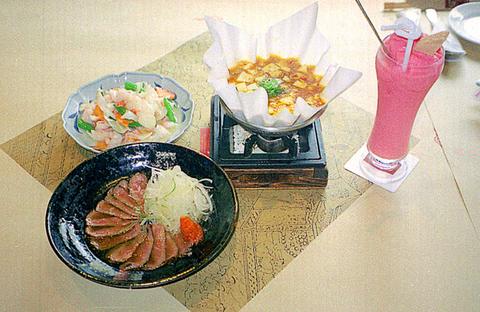The term "modern Chinese cuisine" might not mean much to those who haven't sampled the fare at Taipei's People restaurant (人間), but for the thousands who have frequented the dimly lit yet fashionably chic joint, then the term conjures up images of plates of food that boast a fusion of colors and the truly tantalizing taste explosions that accompany the restaurant's fantastic cuisine.
According to People's manager, Daphne Hua (華昌德), the secret of the joint's continued success lays with People's chefs' ability to blend modern ideas with age-old recipes. Open to the adaptation of simple home-style Chinese cooking, the origins of every dish on the menu lay with those that have been knocked out in kitchens across China for generations.
Not that diners would ever guess that the food they are munching on is of the same ilk as that cooked in homes nationwide. The combination of colors ensures that every dish fashioned in the kitchens of the People restaurant appears almost good enough to frame and hang on the wall. And with no MSG or artificial flavorings added to any of the food the taste remains as pure as nature intended.

PHOTO: GAVIN PHIPPS, TAIPEI TIMES
Keeping the foodstuffs' original taste certainly doesn't make for blandness, however, as People's combination of ingredients means that even the simplest of dishes is a sheer pleasure. Along with the appearance and taste, a meal at the People's won't break the bank or empty your wallet.
Moderately priced and too numerous to list in full, some of the restaurants' most popular dishes include deep-fried chicken slices with lime sauce (檸檬雞片) (NT$300), stir-fried sirloin slices on a pottery plate (陶盤牛肉) (NT$320), simmered sea-bass belly with soy sauce (燜燒魚肚膛) (NT$360), spicy bean curd in a paper pot (人間豆腐) (NT$250) and the interestingly named Buddha's meal (羅漢齋) (NT$280).
Along with a fine selection of savory dishes, the menu also includes an extensive drink list, with the wide selection of cocktails, liquors, beers, teas, coffees and soft drinks all as moderately priced as the food.
While the menu currently lists upwards of 120 dishes, in one month this is set to be cut back to 80. The reason behind People's decision has nothing to do with the seemingly never-ending economic downturn, however. Restaurant management has instead decided to cut the number of dishes on offer in order that the quality of the most popular cuisine can be refined and, if in deed possible, improved upon.

Towering high above Taiwan’s capital city at 508 meters, Taipei 101 dominates the skyline. The earthquake-proof skyscraper of steel and glass has captured the imagination of professional rock climber Alex Honnold for more than a decade. Tomorrow morning, he will climb it in his signature free solo style — without ropes or protective equipment. And Netflix will broadcast it — live. The event’s announcement has drawn both excitement and trepidation, as well as some concerns over the ethical implications of attempting such a high-risk endeavor on live broadcast. Many have questioned Honnold’s desire to continues his free-solo climbs now that he’s a

As Taiwan’s second most populous city, Taichung looms large in the electoral map. Taiwanese political commentators describe it — along with neighboring Changhua County — as Taiwan’s “swing states” (搖擺州), which is a curious direct borrowing from American election terminology. In the early post-Martial Law era, Taichung was referred to as a “desert of democracy” because while the Democratic Progressive Party (DPP) was winning elections in the north and south, Taichung remained staunchly loyal to the Chinese Nationalist Party (KMT). That changed over time, but in both Changhua and Taichung, the DPP still suffers from a “one-term curse,” with the

Lines between cop and criminal get murky in Joe Carnahan’s The Rip, a crime thriller set across one foggy Miami night, starring Matt Damon and Ben Affleck. Damon and Affleck, of course, are so closely associated with Boston — most recently they produced the 2024 heist movie The Instigators there — that a detour to South Florida puts them, a little awkwardly, in an entirely different movie landscape. This is Miami Vice territory or Elmore Leonard Land, not Southie or The Town. In The Rip, they play Miami narcotics officers who come upon a cartel stash house that Lt. Dane Dumars (Damon)

Jan. 26 to Feb. 1 Nearly 90 years after it was last recorded, the Basay language was taught in a classroom for the first time in September last year. Over the following three months, students learned its sounds along with the customs and folktales of the Ketagalan people, who once spoke it across northern Taiwan. Although each Ketagalan settlement had its own language, Basay functioned as a common trade language. By the late 19th century, it had largely fallen out of daily use as speakers shifted to Hoklo (commonly known as Taiwanese), surviving only in fragments remembered by the elderly. In